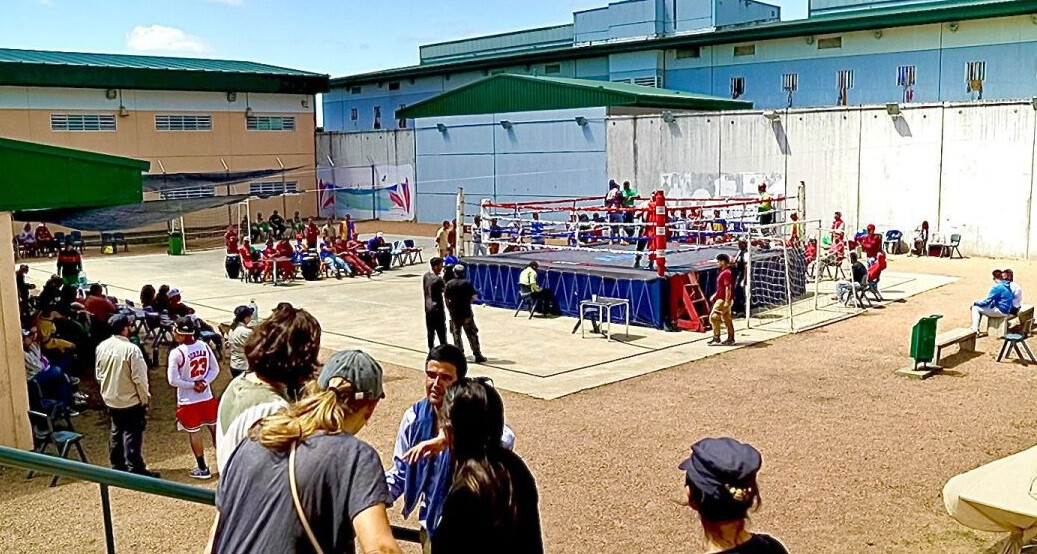
BUENOS AIRES, Argentina – 'Boxing Without Chains (Boxeo Sin Cadenas),' a social sports program aimed at rehabilitating inmates and facilitating their reintegration into society through sports, is celebrating its 13th anniversary this year, offering boxing classes in prisons across the Republic of Argentina. This signifies that beyond simple boxing training, the program instills in inmates the values of discipline, effort, a healthy lifestyle, and the intrinsic values of boxing, providing a crucial opportunity for resocialization.
13 Years of Hopeful Punches
The 'Boxing Without Chains' team successfully kicked off its 13th season of prison boxing classes by visiting Correctional Unit No. 1 in Lisandro Olmos, Unit No. 9 in La Plata, and Unit No. 58 in Lomas de Zamora. Many coaches, trainers, and boxing instructors participated in these events, teaching and encouraging inmates, once again highlighting the program's significance.
This social sports program has been actively operating for years, teaching boxing in correctional facilities, and has received official endorsement from the World Boxing Council (WBC). The WBC now supports and promotes the program through its 'WBC Cares' platform, demonstrating the international recognition of 'Boxing Without Chains'' positive impact.
What is 'Boxing Without Chains'?
'Boxing Without Chains' is more than just a boxing class; it's a social sports program. Its core objective is to instill in inmates the values that boxing provides: discipline, effort, a healthy lifestyle, and respect, perseverance, and self-control.
Inclusion and Reintegration: This program focuses on individuals incarcerated in correctional facilities. Its purpose is to offer them opportunities for personal growth and development, ultimately providing a stepping stone for their reintegration into society. Through boxing training, inmates not only improve their physical health but also develop mental fortitude, experience the process of setting and achieving goals, and regain self-confidence.
Tool for Change: 'Boxing Without Chains' is based on the belief that sports can be a powerful tool for individual transformation and social reintegration. Boxing is not merely a combat sport; it is a process of self-reflection and self-control learned through rigorous training and adherence to rules. This helps inmates reflect on their actions, control impulsive behavior, and improve their interactions with others.
Successful Intervention Model: 'Boxing Without Chains' has become a model for other intervention programs aimed at helping those deprived of their freedom. It holds a unique position by positively impacting rehabilitation and resocialization. The program presents a sustainable model that helps inmates maintain a healthy life through boxing even after release, adapt to society, and avoid reoffending.
International Recognition: The program has received recognition and support from the World Boxing Council (WBC). The WBC has included 'Boxing Without Chains' in its global social initiative, 'WBC Cares,' promoting the importance of social contribution through sports worldwide. This signifies that the 'Boxing Without Chains' program is recognized for its value not just locally, but also internationally.
How Does It Work?
Training and Guidance: Participants receive professional training and guidance in boxing techniques. Experienced coaches and trainers systematically teach inmates everything from basic to advanced boxing skills. During this process, inmates improve their concentration, patience, and problem-solving abilities.
Practice and Matches: In addition to boxing classes, exhibition matches and competitions are organized to promote training, cooperation, and athletic development. These activities provide inmates with a sense of purpose and allow them to experience achievement through healthy competition. They also offer opportunities to learn teamwork and mutual respect, contributing to the development of social skills. These matches are sometimes attended by family members, prison staff, and community members, helping inmates form positive social bonds.
Successful Expansion in Uruguay
The 'Boxing Without Chains' program has also been successfully operating in Uruguay for many years. Sergio Márquez, president of the Uruguayan Boxing Commission (CUBAP), leads this program, and it has had a significant impact on inmate rehabilitation in Uruguay as well.
Recently, a very special boxing event was held at the Punta de Rieles prison. At this event, boxing transcended being merely a sport and became a genuine tool for communication and expression. For inmates, boxing became a space for discipline, respect, and personal growth, playing a key role in their rehabilitation process.
The event was attended by inmates' families, prison staff, the management of Correctional Unit No. 1, and the Quebracho team, who offered great support to the inmates. Additionally, a dedicated team of referees, coaches, and judges from CUBAP participated, creating a valuable space for learning, communication, and support. This helped inmates feel respected as members of society and formed positive connections with the outside world.
The Importance of Rehabilitation Through Sports
The success of the 'Boxing Without Chains' program clearly demonstrates how powerful a tool sports can be in the process of rehabilitation and resocialization. Physical activity helps inmates relieve stress and reduce aggression, and combat sports like boxing, in particular, are effective in building self-defense skills and boosting self-confidence. Furthermore, the strict discipline and perseverance required during training foster qualities necessary for inmates to control their lives and set positive goals.
This program helps inmates prepare for various challenges they may face upon returning to society. The discipline and responsibility gained through boxing can help them find and maintain new jobs, while healthy physical activity contributes to lower recidivism rates and maintaining a positive lifestyle.
The success of 'Boxing Without Chains' in Argentina and Uruguay will serve as a significant inspiration for promoting the adoption of sports-based rehabilitation programs in other correctional facilities worldwide. Such programs can prove to be sustainable models that transform the lives of inmates and contribute to building a better society. It is hoped that programs like 'Boxing Without Chains' will continue to expand, allowing more inmates to find hope and return as healthy members of society.
[Copyright (c) Global Economic Times. All Rights Reserved.]




























